The Myths and Legends of Ancient Greece and Rome (20 page)
Read The Myths and Legends of Ancient Greece and Rome Online
Authors: E. M. Berens
Tags: #Greece, #Rome, #god, #gods, #zeus, #Jupiter, #Aphrodite, #Poseidon, #Neptune, #Roman, #Greek, #Italian, #History, #Divinities, #Harpy, #Harpies, #Pegasus, #Pan, #Sacrifice, #Jason, #Argonauts, #Oedipus, #Troy

Like so many of the Greek divinities, however, the refined conception of the Muses is somewhat marred by the acerbity with which they punished any effort on the part of mortals to rival them in their divine powers. An instance of this is seen in the case of Thamyris, a Thracian bard, who presumed to invite them to a trial of skill in music. Having vanquished him, they not only afflicted him with blindness, but deprived him also of the power of song.
Another example of the manner in which the gods punished presumption and vanity is seen in the story of the daughters of King Pierus. Proud of the perfection to which they had brought their skill in music, they presumed to challenge the Muses themselves in the art over which they specially presided. The contest took place on Mount Helicon, and it is said that when the mortal maidens commenced their song, the sky became dark and misty, whereas when the Muses raised their heavenly voices, all nature seemed to rejoice, and Mount Helicon itself moved with exultation. The Pierides were signally defeated, and were transformed by the Muses into singing birds, as a punishment for having dared to challenge comparison with the immortals.
Undeterred by the above example, the Sirens also entered into a similar contest. The songs of the Muses were loyal and true, whilst those of the Sirens were the false and deceptive strains with which so many unfortunate mariners had been lured to their death. The Sirens were defeated by the Muses, and as a mark of humiliation, were deprived of the feathers with which their bodies were adorned.
The oldest seat of the worship of the Muses was Pieria in Thrace, where they were supposed to have first seen the light of day. Pieria is a district on one of the sloping declivities of Mount Olympus, whence a number of rivulets, as they flow towards the plains beneath, produce those sweet, soothing sounds, which may possibly have suggested this spot as a fitting home for the presiding divinities of song.
They dwelt on the summits of Mounts Helicon, Parnassus, and Pindus, and loved to haunt the springs and fountains which gushed forth amidst these rocky heights, all of which were sacred to them and to poetic inspiration. Aganippe and Hippocrene on Mount Helicon, and the Castalian spring on Mount Parnassus, were sacred to the Muses. The latter flowed between two lofty rocks above the city of Delphi, and in ancient times its waters were introduced into a square stone basin, where they were retained for the use of the Pythia and the priests of Apollo.
Â
The libations to these divinities consisted of water, milk, and honey, but never of wine.
Their names and functions are as follows: -
Â
Calliope
, the most honoured of the Muses, presided over heroic song and epic poetry, and is represented with a pencil in her hand, and a slate upon her knee.
Â
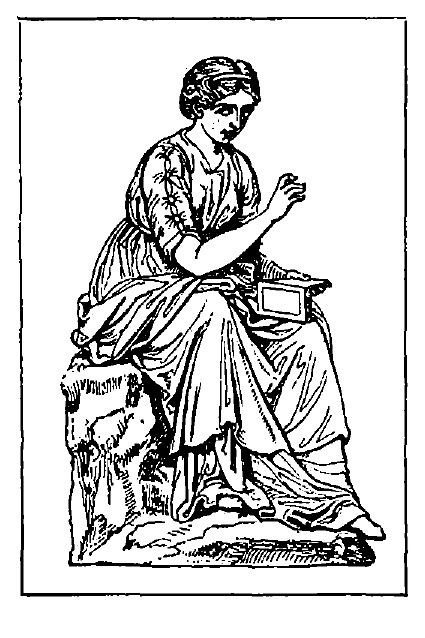
Â
Â
Clio
, the muse of History, holds in her hand a roll of parchment, and wears a wreath of laurel.
Â
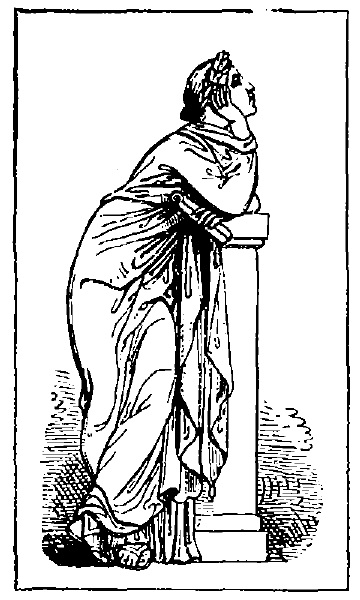
Â
Â
Melpomene
, the muse of Tragedy, bears a tragic mask.
Â
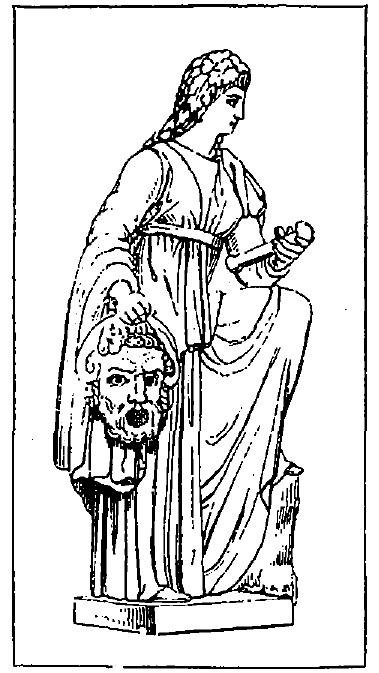
Â
Â
Thalia
, the muse of Comedy, carries in her right hand a shepherd's crook, and has a comic mask beside her.
Â
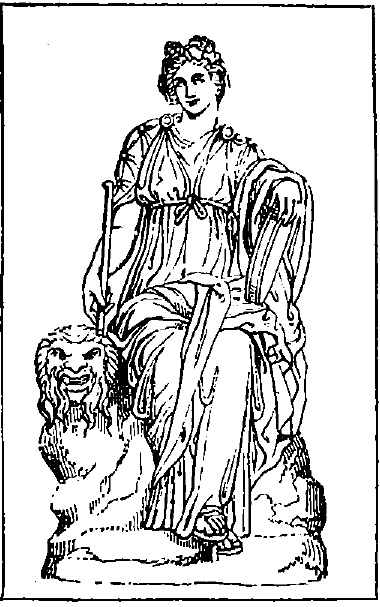
Â
Â
Polyhymnia
, the muse of Sacred Hymns, is crowned with a wreath of laurel. She is always represented in a thoughtful attitude, and entirely enveloped in rich folds of drapery.
Â
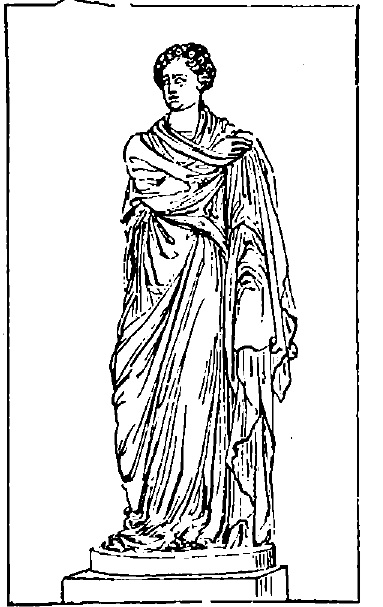
Â
Â
Terpsichore
, the muse of Dance and Roundelay, is represented in the act of playing on a seven-stringed lyre.
Â
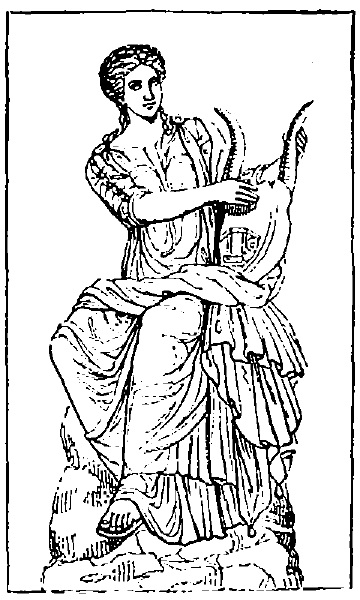
Â
Â
Urania
, the muse of Astronomy, stands erect, and bears in her left hand a celestial globe.
Â
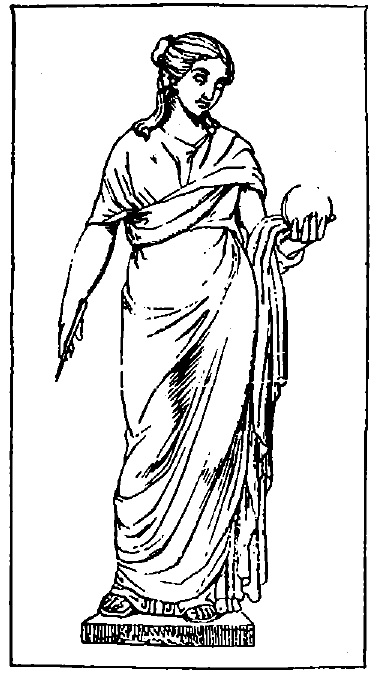
Â
Â
Euterpe
, the muse of Harmony, is represented bearing a musical instrument, usually a flute.
Â
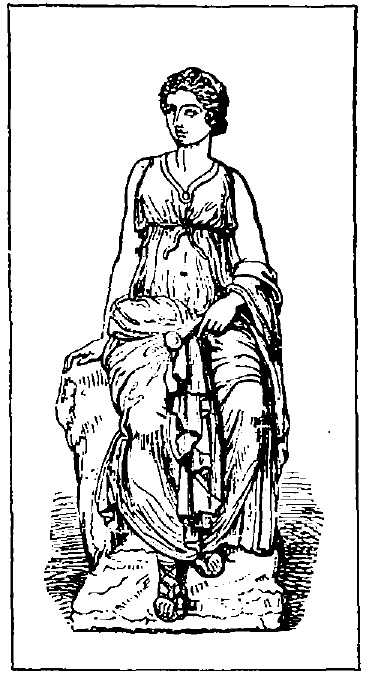
Â
Â
Erato
, the muse of Love and hymeneal songs, wears a wreath of laurel, and is striking the chords of a lyre.
Â
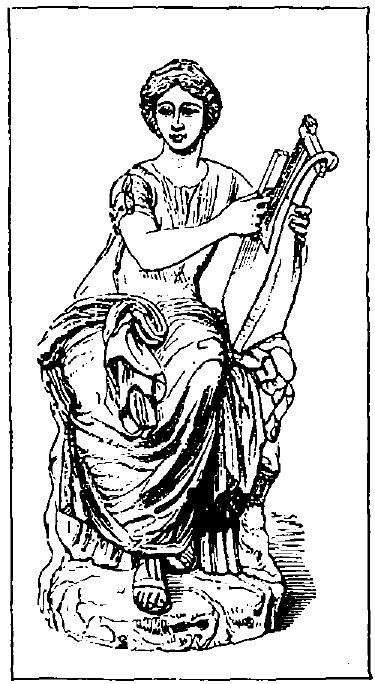
Â
Â
With regard to the origin of the Muses, it is said that they were created by Zeus in answer to a request on
the part of the victorious deities, after the war with the Titans, that some special divinities should be called into existence, in order to commemorate in song the glorious deeds of the Olympian gods.
Â
Â
Â
Pegasus was a beautiful winged horse who sprang from the body of Medusa when she was slain by the hero Perseus, the son of Zeus and Danaë. Spreading out his wings he immediately flew to the top of Mount Olympus, where he was received with delight and admiration by all the immortals. A place in his palace was assigned to him by Zeus, who employed him to carry his thunder and lightning. Pegasus permitted none but the gods to mount him, except in the case of Bellerophon, whom, at the command of Athene, he carried aloft, in order that he might slay the Chimaera with his arrows.